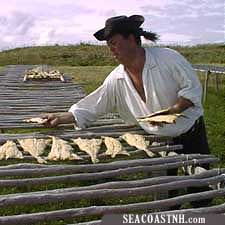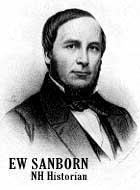|
FRESH STUFF DAILY |
|
|
||
|
|
||
|
|
||
|
SEE ALL SIGNED BOOKS by J. Dennis Robinson click here |
||
READ: Founding of New Hampshire NOTES ON THIS ESSAY Early Settlers of New Hampshire No bells, bonfires nor cannon announced the arrival of the little barque which sailed up the "deep waters" of the Piscataquack in 1623, and landed on Odiorne's Point, the founders of a new State. Tradition does not repeat nor history record the name of the ship nor of the captain who commanded it. The Mayflower and the men who landed on Plymouth Rock, in 1620, are as famous in history as Jason and his associates, who sought the Golden Fleece, are in ancient mythology. New England men never weary of eulogies of forefathers' day; and they will, probably, never cease to commemorate the heroism and piety of those forty-two god-fearing men, who signed the first written constitution known to human history. Still, the Plymouth Colony, by itself, wrought no nobler or better work for mankind than the unnoticed, almost unnamed colonists who founded New Hampshire. Massachusetts Bay settlers, the Puritans, eclipsed the humbler efforts of the Pilgrims at Plymouth. The Pilgrims bore the sufferings of exile, privation and toil; but the Puritans at a later date appropriated the fame and the honor which rose from the laws, government and institutions of Massachusetts. Capt. John Mason, the Proprietor of New Hampshire, sent over fifty Englishmen and twenty-two women, besides eight Danes who were employed in sawing lumber and making potash. This number exceeded that of the Mayflower. It is not probable that all these men and women came in the first ship. Many of them arrived several years after the first company of planters occupied Odiorne's Point. There is no reason to suppose that many women, possibly not one, came in 1623. Some writers suppose that the Hiltons and a few other leading men brought their wives with them. For, ten years after the first settlement, the letters of the proprietor and his agents in London, speak of sending the wives of some of the colonists or of supporting them, at the company's expense, at home. The very slow progress of the settlements at Cocheco and Strawberry Bank show that the laborers were few; for only three houses had been built, on the Bank in seven years, and only three in ten years, at the upper plantation. If families were united in these labors, six houses would scarcely suffice for eighty persons. Why were these colonists less renowned than the Pilgrims of Plymouth? The previous history of the Pilgrims, their persecutions at home, and their residence in Holland made them famous. Religion occupied the thoughts of all Englishmen. The Pilgrims were exiles for conscience' sake; they suffered for the common liberties and rights of the whole people. The first settlers at Portsmouth and Dover were adventurers, bold, hardy, and resolute, like all pioneers who go into the wilderness to better their condition. Such is generally the character of emigrants who found new states. Philosophers tell us that from the race, the epoch and the surroundings of a people, their future history may be accurately predicted. Here then is a problem for the prophet's solution. The race is Saxon; the epoch is one of progress; enterprise, discovery and controversy, both vrith the pen and the sword. The surroundings are the wilderness before them and the ocean behind them. The soil is rugged; the climate is severe. Tell me, then, thou boasting seer, what will be the fate of this handful of men, as destitute and helpless as though they had dropped upon the earth from some distant planet. Will, they die of starvation, be devoured by wild beasts or be massacred by savages? By occupation, they" were fishmongers, farmers and mechanics. "Their several businesses" assigned by their employers, were to fell the trees, till the soil, fish, hunt and mine. Incessant labor in these occupations failed to support them; and the proprietors were obliged to sink their fortunes in the abyss of debt which these plantations opened. John Mason, who was a man of mark, and would have been distinguished in any age, was financially ruined; but like Phaeton, guiding the chariot of the sun, he fell from great undertakings. Instead of securing coronets and mitres for his posterity he died the victim of disappointed hopes: "No son of his succeeding." The men he hired to plant his colony had not sufficient education, religion nor integrity to make them true to their trust. That they were illiterate, appears from the fact that many of them could not write their names. So little is said of their religion that, it may be presumed they had none to speak of. They did not attempt to gather a church, at Dover, till 1638. Then, they were broken up by quarrels, and some of their early clergymen were fitter for the penitentiary than the pulpit. At Portsmouth, no provision was made for preaching till 1640, when a Glebe of fifty acres was granted for the support of an Episcopal chapel; and Richard Gibson was the first incumbent. The first Congregational church was formed much later. The founders of Exeter and Hampton were led by clergymen, and churches sprang up with the towns themselves. That the servants of Mr. Mason were dishonest appears from the fact that, after his death, they plundered his estate, drove away his cattle that he had imported at great expense, and sold them in Boston for twenty-five pounds sterling a head, and appropriated his goods. There was no local government sufficiently powerful to punish great crimes; while the proprietor ruled through agents, factors and superintendents, there was little restraint over servants but the personal influence of the so called governors. The laborers were the" hired men" of the proprietor who lived three thousand miles away. They were neither masters of their time, their labor, nor of its rewards. If the value of plantations and mills was enhanced, the profit was not for them. They neither owned the premises where they worked, nor shared the gains nor losses that resulted from their labors. When they became free-holders, and made compacts or "combinations" for the better government of the plantations, and the more certain punishment of crimes, the stimulus of property, liberty and suffrage elevated the laborers, and fitted them to do, dare and suffer more than any other New England Colony. The people of Portsmouth formed a political compact as early as 1633, but it gained from the crown no authority to make laws or pun-ish offenders. Dr. Belknap says, that, till 1640, the people of Dover and Ports-mouth had no power of government delegated from the King. At that time, they formed themselves into a body politic as the people of Exeter had done the year before. The next year, 1641, all the four plantations formed a union with Massachusetts, and voluntarily submitted to her jurisdiction. They were allowed peculiar privileges, for in 1642, the following decree was passed by the General Court of Massachusetts: "It is ordered that all the present inhabitants of Piscataquack, who formerly were free 'there, shall have liberty of freemen in their several towns to manage all their town affairs, and each town [shall] send a deputy to the General Court, though they be not church members." From this date the laws, usages and customs of the larger colony became the inheritance of the smaller; and the union which continued for thirty-nine years, was "a consummation devoutly to be wished," by both the high contracting parties. OUTSIDE LINK: Prof. Sanborn at Dartmouth Please visit these SeacoastNH.com ad partners.
News about Portsmouth from Fosters.com |
| Thursday, April 18, 2024 |


|
Copyright ® 1996-2020 SeacoastNH.com. All rights reserved. Privacy Statement
Site maintained by ad-cetera graphics

 Smuttynose Murders
Smuttynose Murders




 When possible SeacoastNH.com makes early New Hampshire writing available as a public service to our readers. This essay is from an 1877 edition of The Granite Monthly, a new magazine at the time. Edwin David Sanborn (1808-1885) was born in Gilmanton, NH and married a niece of Daniel Webster. He was a professor at Dartmouth. Sanborn’s History of New Hampshire was published in 1875 two years before the founding of the Granite Monthly magazine. We have added paragraph breaks that are not in the original. NH historians often compare the well known founding of the Bay Colony to the relatively unknown start of New Hampshire. Early proprietary history of NH under John Mason is a complex topic. This essay may – or may not – help readers understand it a little better. THe top photo is of a re-enactor at Louisbourg, Nova Scotia.-- JDR
When possible SeacoastNH.com makes early New Hampshire writing available as a public service to our readers. This essay is from an 1877 edition of The Granite Monthly, a new magazine at the time. Edwin David Sanborn (1808-1885) was born in Gilmanton, NH and married a niece of Daniel Webster. He was a professor at Dartmouth. Sanborn’s History of New Hampshire was published in 1875 two years before the founding of the Granite Monthly magazine. We have added paragraph breaks that are not in the original. NH historians often compare the well known founding of the Bay Colony to the relatively unknown start of New Hampshire. Early proprietary history of NH under John Mason is a complex topic. This essay may – or may not – help readers understand it a little better. THe top photo is of a re-enactor at Louisbourg, Nova Scotia.-- JDR














